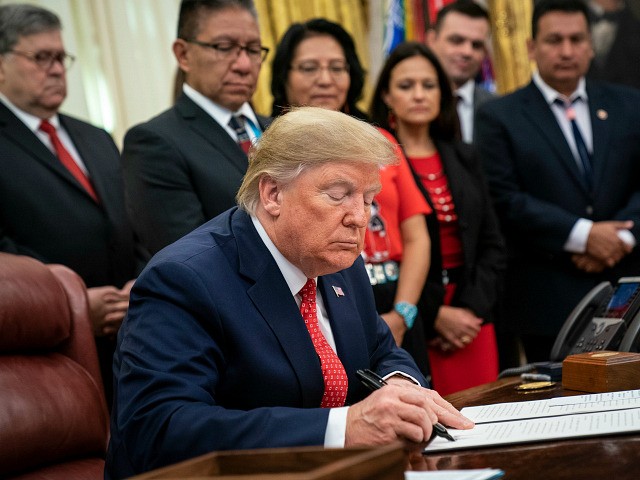President Donald Trump has tasked three members of his Cabinet to work together to investigate the high number of American Indians and Alaska Natives who have been murdered or gone missing.
The Department of the Interior, Department of Justice, and Department of Health and Human Services met as a task force for the first time on Wednesday, co-chaired by Secretary of the Interior David Bernhardt and Attorney General William Barr.
The task force “is composed of federal officials charged with enhancing the criminal justice response, consulting with tribal governments on potential solutions and empowering native communities with information,” a press release announcing the new campaign said.
“President Trump is committed to addressing systemic challenges in Indian Country, and this task force will develop and implement an aggressive, government-wide strategy to combat the crisis of missing and murdered American Indians and Alaska Natives,” Bernhardt said. “By working together and listening to impacted citizens and tribal communities, we intend to tackle these complex issues.”
“The disappearance and death of American Indian and Alaska Native people, particularly women and girls, is an especially tragic chapter in a long story of marginalization and trauma suffered by native people,” Barr said. “We are committed to addressing this challenge, to reducing the violence and protecting the vulnerable from exploitation and abuse.”
“The task force is eager to get to work to address the issues that underlie this terrible problem, and work with our tribal partners to find solutions, raise awareness, and bring answers and justice to the grieving,” Barr said.
“I am grateful that President Trump has made it a priority to tackle the tragic issue of missing and murdered American Indians and Alaska Natives,” HHS Secretary Alex Azar said. “Native Americans deserve safety and security in their communities, and HHS has a vital role in helping by providing culturally appropriate prevention and trauma informed services to victims and their families.”
“I am committed to working in partnership with President Trump, Attorney General Barr, Secretary Bernhardt, and tribal leaders and members to make a positive impact on this important challenge,” Azar said.
Trump has called the high rates of violence in the Native American community “sobering and heartbreaking.”
The task force, dubbed Operation Lady Justice, will “review Indian Country cold cases, to strengthen law enforcement protocols, and work with tribes to improve investigations, information sharing and a more seamless response to missing persons investigations.”
The announcement of the campaign detailed how the task force will address the issue:
- Consult with tribal governments on the scope and nature of the problem and will hold regional consultations and listening sessions at several locations around the country;
- Develop model protocols and procedures for addressing both new and unsolved cases of missing and murdered persons in tribal communities;
- Establish a multi-disciplinary, multi-jurisdictional team, which will include tribal law enforcement, to review cold cases;
- Address issues related to roles, authorities and jurisdiction among tribal, local, state and federal agencies; and
- Develop and execute a public awareness, education and outreach campaign for affected communities.
- The task force will host its first listening session at the National Congress of American Indians’ Executive Council Winter Session in Washington, D.C. on February 12.
Other members of the task force are Katharine Sullivan, principal deputy assistant attorney general; Tara Sweeney, assistant secretary for Indian Affairs at DOI; Terry Wade, executive assistant director, criminal, cyber, response and services branch at the FBI; Laura Rogers, acting director, Office on Violence Against Women; Charles Addington, deputy bureau director, Bureau of Indian Affairs, Office of Justice Services; Trent Shores, U.S. Attorney for the Northern District of Oklahoma and chairman of the Native American Issues Subcommittee of the Attorney General’s Advisory Committee; and Jean Hovland, deputy assistant secretary for Native American affairs and commissioner, administration for Native Americans, Department of Health and Human Services.
“This initiative’s important to Indian Country and Alaska Native communities,” Sweeney told ABC News. “And if the current practice had been effective, we wouldn’t be here today.”
“Of almost 6,000 indigenous women reported missing in 2016, only 116 were logged into the Justice Department’s missing persons database, according to a report by the Urban Indian Health Institute,” ABC News reported.
As part of Trump’s executive order, Barr named Marcia Good of the Department of Justice as the executive director of the task force.
The task force will host its first listening session at the National Congress of American Indians’ Executive Council Winter Session in Washington, DC, on February 12.
The task force will issue a progress report to the president on Nov. 26, 2020, with a final report deadline of Nov. 26, 2021.
Follow Penny Starr on Twitter.

COMMENTS
Please let us know if you're having issues with commenting.